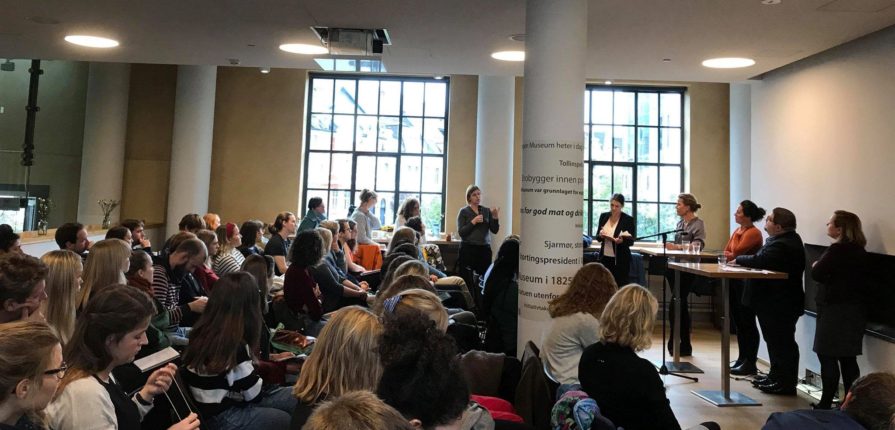SEMINAR: A large audience gathered to participate at the public seminar on migration to Europe.
Migration is one of the major political issues in Europe today. European governments have struggled to handle the large number of refugees, and to agree on an acceptable distribution of burdens between the different national states. At the same time, nationalist and anti-immigrant attitudes have been prevalent in many recent national elections.
To get a better understanding of the challenges of migration, Centre for Research on Discretion and Paternalism, in cooperation with Lawtransform and Bergen Resource Centre, brought some of the leading experts on the topic together for a public seminar in Bergen.
Numbers returning to pre-surge levels

PHOTO: Kjersti G. Berg, Bergen Resource Centre
Mark Lopez from Pew Research Centre startet the seminar by presenting statistics on migration to Europe. One of the findings he shared was that the number of unaccompanied minors (UAM) peaked in 2015, when there were 110 000 asylum applications from UAM´s in European Union countries, Norway and Switzerland. This was a large increase from 14 000 in 2013. However, the number of asylum applications have now droped and is returning to pre-surge levels.
Lopez also presented findings from attitude surveys revealing that many Europeans disapprove of Brussels’ management of the refugee issue. On the question about whether decisions concerning migration of Non-EU citizens into their country should be made by the EU or their national government, a large majority answered that the decisions should be made by their national governments.
Hospitality crisis
After the presentation, Lopez was accompanied by Sagrario Segado, Christine Jacobsen and Frøy Gudbrandsen in a panel discussion. Political editor Gudbrandsen has covered the topic of unaccompanied migrating minors for Norwegian newspaper Bergens Tidende, and also met with migrants on their way to Europe. She argued that this is a very complex and difficult problem. The children and youths are exposed to major risks on their journey to Europe, and often don’t meet the criteria for permanent settlement in Norway.

PHOTO: Kjersti G. Berg, Bergen Resource Centre
Gudbrandsen points out that many minors would probably have been better off staying in their home country. Although we have an obligation for protecting the rights of children in Norway. It is very difficult to balance the obligation we have to take care of minors that are already here, and not encouraging more children to risk a dangerous journey.
Sagrario Segado has experienced the migration situation at close range in the Spanish town of Melilla in North-Africa. A key message from Segado was that the situation has not been handled well by the national government, and that especially the unaccompanied minors are given insufficient protection and that the proceedings are too long. This view was shared by Christine Jacobsen, who has followed the situation in France, where she used the long case processing and lack of support for the children to describe a hospitality crisis.
Research on migrating minors
Prof. Marit Skivenes from Centre for Research on Discretion and Paternalism moderated the discussion. Skivenes is also leading a research project on child protection, which study differences in child’s best interest considerations between migrant and non-migrant children. After the seminar, Skivenes elaborated on the ongoing research.
– The discussion today show how unaccompanied minors encompass unique challenges, as child’s best interests principle is pitted against economic considerations and a states migration policies. One of the issues where we hope to gain insight from the Acceptability-project is on how European judicial systems reason through the child’s best interest when immigration and residency considerations are at stake.
- Read more about the Acceptability-project

